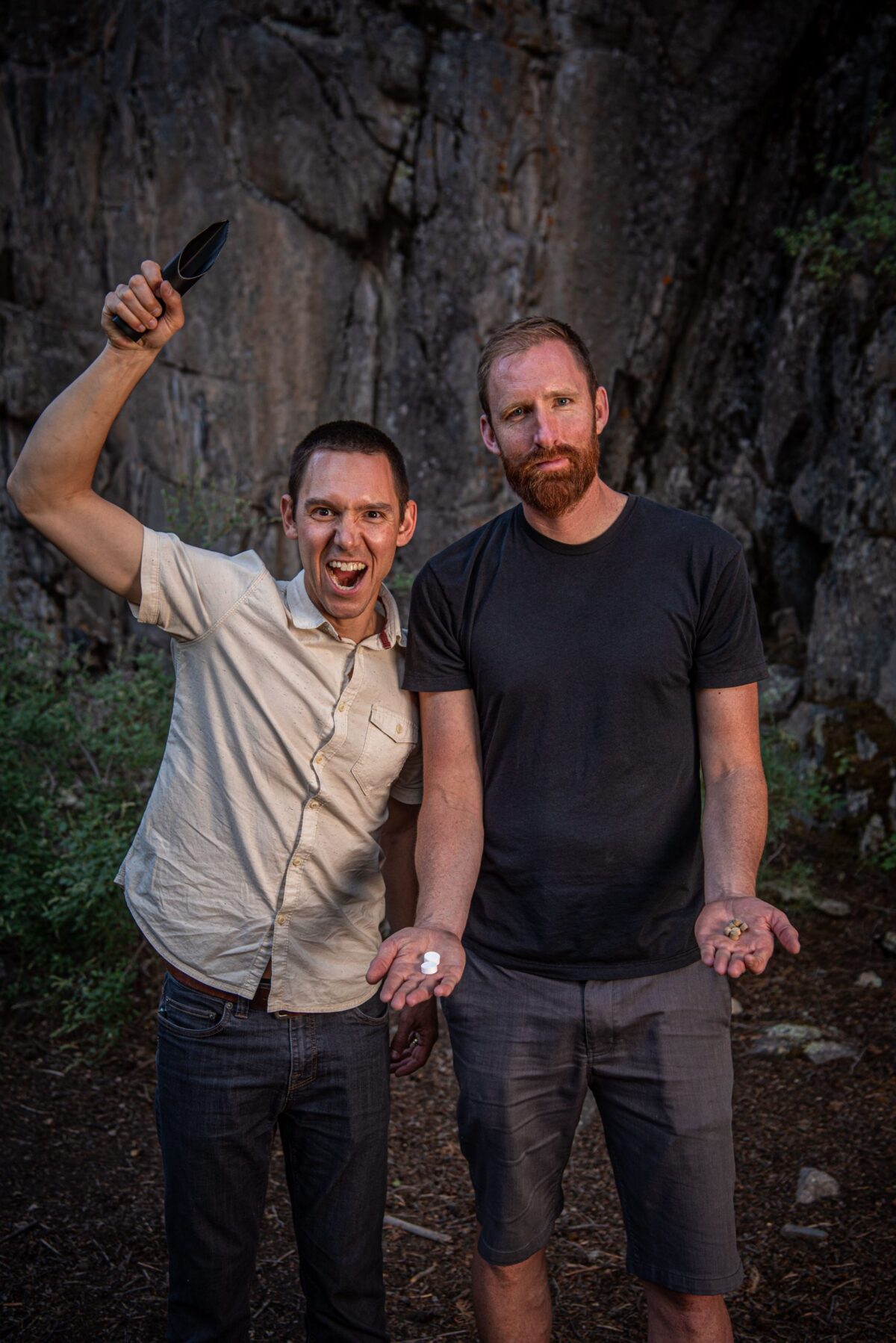This piece is the first in our Sustainable Business Series, which will highlight businesses with close ties to Western and the Gunnison Valley that embody sustainability in their operations.
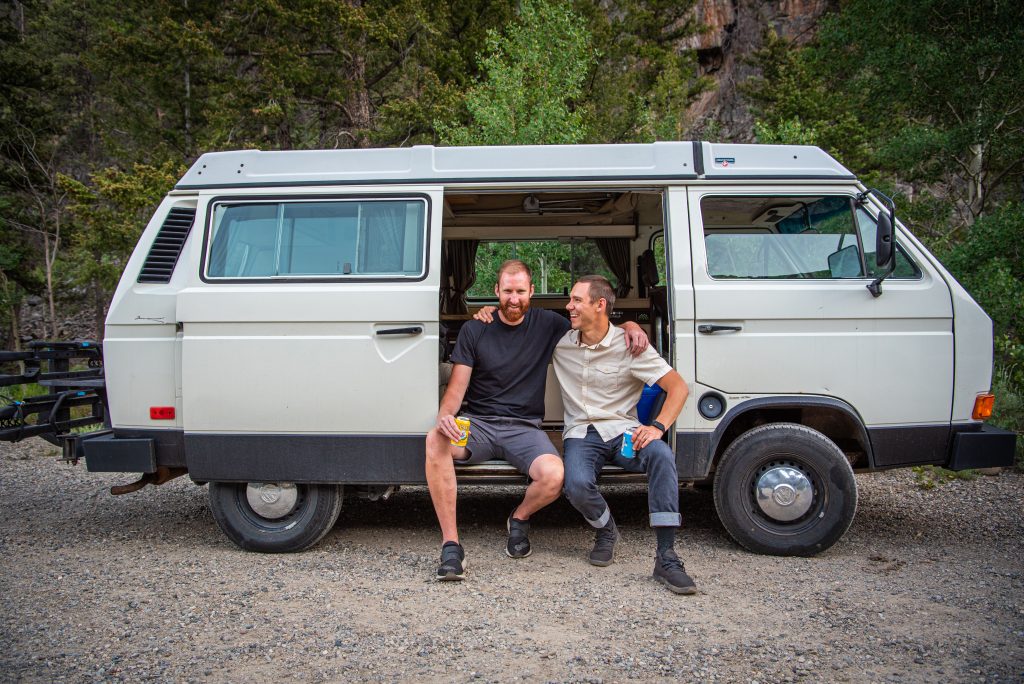
Imagine you’re backpacking in the high desert amidst frozen, rock-hard soils in the winter, or perhaps you’re climbing in the heart of canyon country amidst a sea of rocks in the fall — or maybe you’ve been camping out near a fragile, high alpine lake in the dead of summer, and all of a sudden you hear nature’s unmistakable call.
Are you adequately prepared? Is your shovel ready for battle with the hard, rocky ground? Are you digging a deep enough cat hole? Are you well-suited to feel clean after completing your business?
There are fundamental questions for recreationists, and questions that PACT Outdoors, a company headquartered in Crested Butte, is seeking to answer.
The company was founded by Noah Schum and Jake Thomas in the fall of 2020, and the pair can frequently be spotted working in the ICELab on Western’s campus. Their upstart company designs and manufactures intuitive and innovative outdoor waste kits that make doing your business outdoors clean, comfortable, and easy.
Meet the founders
Schum’s professional background is in marketing, which he studied at the University of Colorado’s flagship Boulder campus. He began his career in the data storage realm at a tech company, before pivoting his way over to the product side.
“That’s where I found my love of product, but I didn’t love tech or data storage,” adds Schum with a grin. Schum bounced around a bit before landing at Rocky Mounts, a bike and car rack maker, then headquartered in Boulder.
At Rocky Mounts, Schum gained an appreciation for outdoor industry products, the design and manufacturing process, and how and why consumers bought them. After a three-year stint, Schum was recruited to work for Boa Technology, a company in Denver that produces specialized laces for snowboard boots, golfing shoes, and other footwear.
Schum came in during the expansive growth phase, when Boa was receiving an influx of investment capital. He worked for Boa for over six years, managing accounts and planning the company’s manufacturing.

“When I left Boa, I was spending quite a bit of time in China working on efficiencies and utilization, taking a sales or marketing plan and turning that into: ‘how do we make a product?’ because we were growing so fast,” says Schum.
He and his wife decided that raising their kids in the mountains was a top priority, so they departed the Front Range and set off for the Western Slope, where Schum has childhood roots in Hotchkiss.
Soon after, PACT Outdoors was born.
“It’s an all-in-one bathroom kit for outdoor adventures,” says Schum of the company. His partner and co-founder Jake Thomas, who also boasts marketing experience, previously worked for a marketing agency that contracted with corporate giants like Ford and Adidas.
The Genesis of PACT Outdoors
Thomas was the driving force behind the original conception of PACT Outdoors. As a rock climber, one of Thomas’ “pain points” was having to deal with the WAG Bags, a waste bagging and gel breakdown system commonly used by outdoor recreationists in sensitive natural spaces where digging holes can be impractical or environmentally unsound.
Using the WAG bags can be unpleasant, and doing so while exposed in the outdoors with spare shreds of toilet paper is even worse.
Thomas pitched his vision for a better outdoor waste handling system to Schum, who initially wasn’t that interested.
“I spend a lot of my time in the backcountry, where that’s not a [huge] problem. [Whereas] climbers are all congregated around the same area [where that can become an issue] … but I’m a hunter, or a fisher, or a backpacker, and that’s usually not an issue packing waste out — burying is an appropriate practice,” notes Schum.
Despite their initial disagreement, Schum and Thomas realized that no products exist to challenge the traditional methods: using the dreaded WAG bags or carting a generic mini shovel into the wild and digging your six-inch hole, often difficult in many areas of Colorado.
They also realized that many home “hacks” exist, where people create their own homemade, Macgyvered solutions for dealing with the backcountry waste issue.
“The key for us was realizing that there’s an opportunity to solve that hack in a better, more efficient manner, and give people the tools and technology that they really need,” says Schum.
Schum notes that when partaking in outdoor activities like backpacking or camping, tried-and-true systems abound. Experienced recreationists and guides have concocted intricate systems for tent setup, campsite layout, backcountry cooking, and hanging bear bags.
Schum adds, however, that proper backcountry bathroom etiquette and technique is often absent from these plans, and rarely discussed. Most importantly for PACT Outdoors: people were cobbling together go-kits comprised of partially expended toilet paper rolls, travel hand sanitizers, and baby wipes.
Schum and Thomas set out to create a comprehensive bathroom kit to give consumers the tools, techniques, and underlying confidence to conduct their business outdoors comfortably.
“Then there was the environmental impact. We [realized that] we can build products that are better, as we are seeing so much waste buildup at campsites, trailheads, and public lands,” articulates Schum.
He adds that one of the key issues that PACT Outdoors had to resolve upon its founding was the “Goldilocks” complex. “We wanted our flagship product to appeal to the broadest market. So, it was really about understanding who that market was,” relays Schum. So, the duo conducted a series of consumer interviews to better understand the market and prospective consumers.
What they found was that their initial plan, to create kits that appealed to the “tip of the spear” consumers likely wouldn’t work, as this knowledgeable and enterprising sect of the consumer base had their own systems and techniques that they felt good about.
What they also discovered in those interviews, however, is that many consumers did not feel good about their backcountry waste habits, and so that gap became where Schum and Thomas focused their efforts.
Couple the consumer confidence issue with the growing backcountry waste problem, and PACT Outdoors had found its missions and underlying mission: provide consumers the tools they need to feel good about conducting their business outdoors and help green the process along the way.
Introducing the product
They started with component number one in their kit: the shovel, which according to Schum (and to PACT Outdoors consumers) is now the best on the market after the co-founders heavily invested in its design.
“Why? Because if the shovel is uncomfortable or sharp in your hands, you’re not going to dig six to eight inches,” says Schum.

The second component in a PACT Outdoors waste kit are the compressed wipes. Schum says there was some lively discussion on the topic of wipes versus toilet paper within the team.
The compressed wipe system ended up being ideal. “They’re lightweight, they’re easy to use. If they get wet, they just expand, and they don’t break down like toilet paper. You can’t crush them, [and] they’re easy to backpack,” says Schum.
The wipes, which expand from a small tablet to 9”x 9” size, are composed of organic material and accelerate the waste breakdown process brought on by the use of mycelium, the special ingredient in a PACT Outdoors kit.
In addition to this synergy, the wipes provide a “wow factor” for consumers when they see them expand from their original form.

Mycelium is the key to elevating the PACT Outdoors system on both an environmental and business level, facilitating rapid breakdown of human waste, while also serving as a key product differentiator insulating PACT’s business model from easy copycatting.
Mycelium is the root system of fungus, and is, as Schum eloquently puts it, “nature’s great decomposer.”
Schum and Thomas went all in on mycelium, conducting nine months of specialized research with a mycologist to identify the right strain to use in coordination with human waste. PACT’s kit includes 60 tabs of mycelium, grown in South Carolina, three of which are used for every outdoor “event.”

The last major component of the PACT Outdoors kit, the hand sanitizer, came down to two options: gel or spray. Schum notes that consumers want to feel clean in the outdoors. “How do we facilitate that?” he asks.
The team ultimately went with a spray hand sanitizer, sourced locally and organically right here on the Western Slope of Colorado. “It’s a gin distiller, basically, and it’s the heads and tails of the gin,” notes Schum.
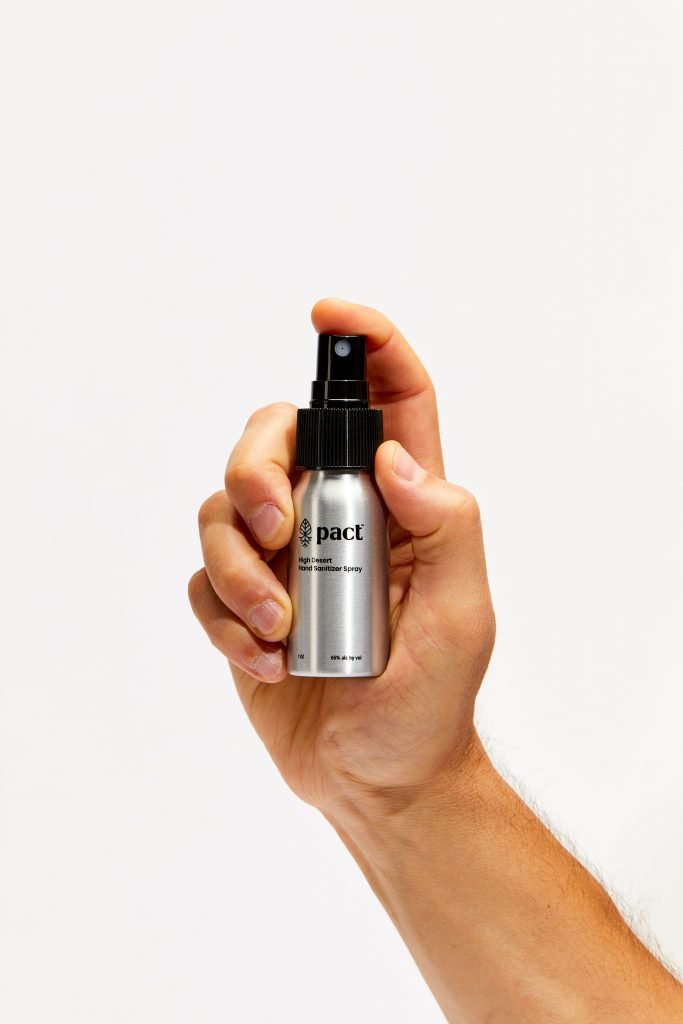
Finally, combine these four individual products with a lightweight, tri-fold cased bag capable of taking on additional bathroom-related supplies. Schum said the bags were designed to be compact and ready for “grab-and-go” use, suiting both their customers’ busy lifestyles and the desire to have one, centralized solution to a thorny outdoor problem. Fully stocked, the whole kit comes in at under 12 ounces.
To protect their kit’s products from knockoffs or replicates, the PACT team are in the patent process for the forthcoming iteration of their shovel, which will build-in the kit’s components for lightweight, backcountry use.
“As far as [potentially] patenting mycelium, mycelium is a 500-million-year-old technology, it’s difficult to patent. That’s like trying to patent yeast,” Schum adds with a grin.
But the extensive research they conducted should do the trick for now as the company continues to grow.
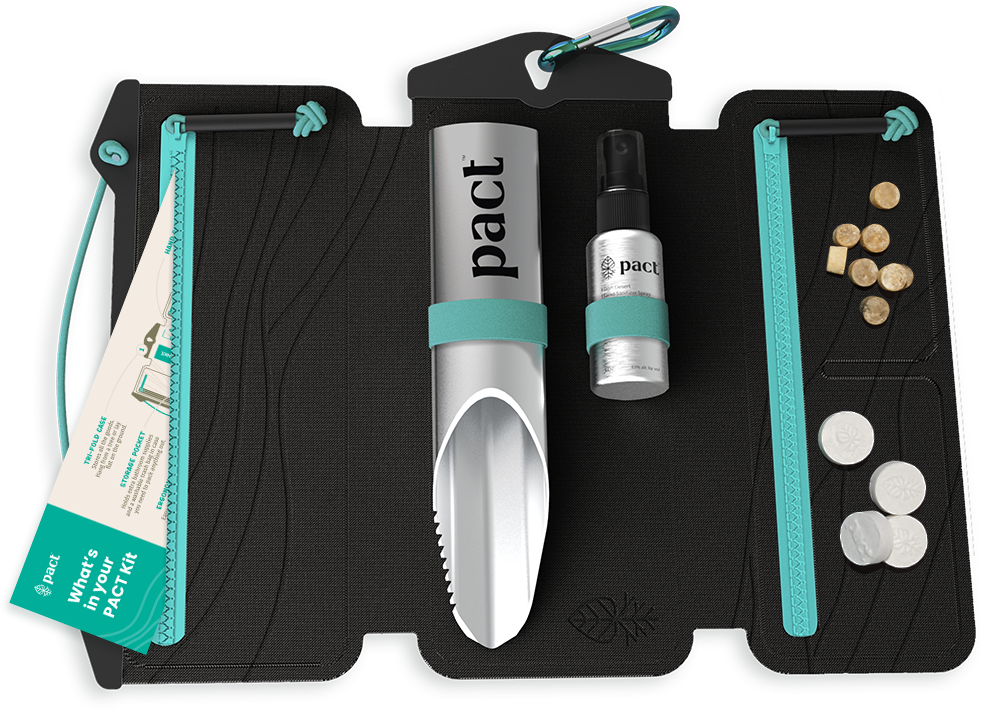
Elevating the business
A key turning point in PACT Outdoors’ journey was their acceptance and participation in the eight-week Moosejaw Accelerator Program, a collaboration between Moosejaw, a leading outdoor retailer (the second largest in the U.S.), and Gunnison’s ICELab that Schum first became aware of while attending the ICELab’s Coffee with Coworkers events.
Those conversations sparked the idea that became PACT Outdoors, and also served to introduce Schum and Thomas to the accelerator program, which they were soon accepted for.
“I think our biggest [program] benefit was connecting with this community, and utilizing the team at the ICELab. They will help any business. You walk in with an idea, and they’ll go full tilt to make sure you get [resources],” says Schum, who adds that connecting with the ICELab and fellow upstart businesses also eased the burdens of undergoing the lonely process of striking out on your own.
“It’s the highest highs and the lowest lows,” he adds.
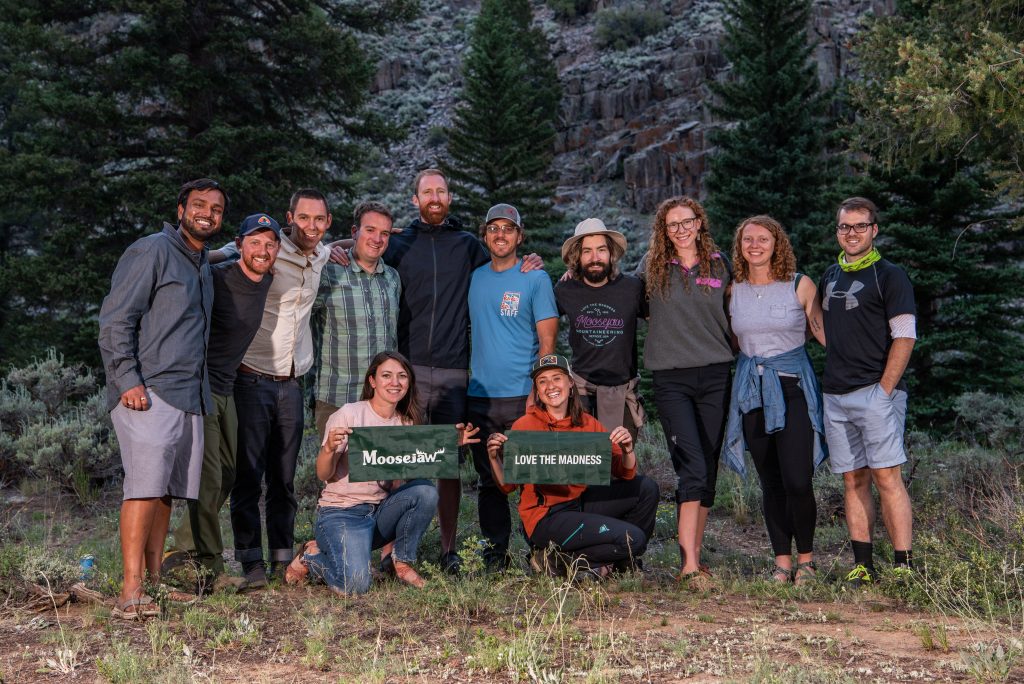
Participating in the program catalyzed the company’s progression, pushing the team to formalize their ideas, lock-in their products, and start thinking seriously about production and sales. With the program’s assistance, PACT Outdoors was able to get a product from concept in the fall of 2020 to market in the summer of 2021, despite the pandemic and ongoing supply shortages that erected systemic barriers for many companies.
Schum credits the expedience of that process to his and Thomas’ experience in the business sphere, but also to the crack business development team at the ICELab that provided guidance throughout the journey.
Exiting the accelerator program with a refined idea and a honed sense of purpose, PACT Outdoors was soon ready to start selling. PACT Outdoors operates multiple sales streams, including on MooseJaw’s website and on their own website.
The company also maintains a presence in brick-and-mortar retailers. With their recent recognition as an Outdoor Retailer Innovation Award winner, they are looking to expand their reach to more physical stores, both within the valley and beyond.

Manufacturing the product
One of PACT Outdoors’ biggest competitive advantages are the production and manufacturing connections that Schum and Thomas bring, and the speed with which these connections allow them to bring their products to market and maintain consistent production despite global market shockwaves. Schum’s connections in China have proved particularly helpful for producing several of the kit’s headlining components.
The extruded shovel is produced at a specialized Chinese aluminum and metal manufacturer. Other parts made in China, like the spray bottles for the hand sanitizer, are simpler and can be produced at numerous manufacturers, and just need custom, branded printing.
The compressed wipes and the kit bag can be traced back to a specialized wipes manufacturer, and an outdoor soft goods manufacturer, respectively.
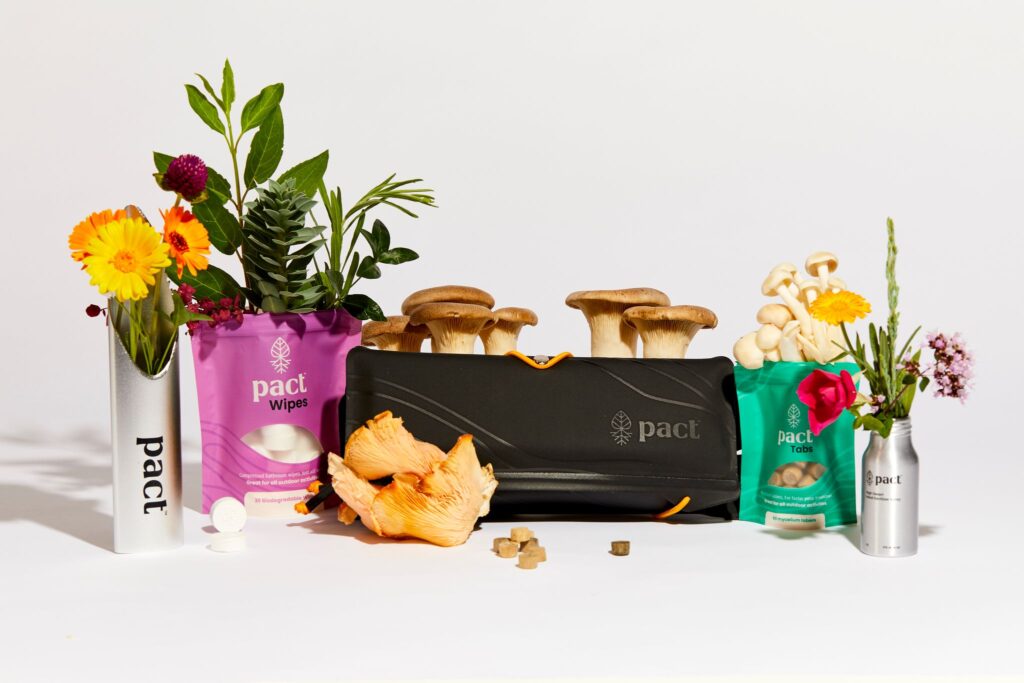
“There’s kind of a negative connotation about China, obviously, and I feel the opposite. This product would not be affordable if we didn’t have those components. My experience with that is just knowing the factory contact and being able to work directly with them,” says Schum, which he notes helps alleviate the risk of overseas production horror stories resulting in botched or delayed products.
Once the components come together, they are packaged in-house in a garage in Crested Butte, and Schum’s kids even get in on the action.
The marketing side
One challenge facing PACT Outdoors is the seasonality of its product. Kits may fly off the shelves in spring as recreationists gear up for the summer, and during the summer when many explore the backcountry, but will likely slow in the fall and winter months.
One exception: the holidays. “We had an amazing December. This was a perfect product for stocking-stuffers, it’s an outdoor product that nobody had,” says Schum, noting that winning the 2021 Popular Science “Best of What’s New” Award also boosted their winter sales.
Another sales and marketing outlet that the company has already had some success with is outdoor guiding companies. Schum relays that the professional guides from many of these companies appreciate their company’s all-in-one kit, and will buy them for their guided expeditions.
Schum recalls an outdoor guide telling him that their clients pay $1,000 per day to come fish with them, and the guides dole out a bag of toilet paper and wish their clients “good luck.”
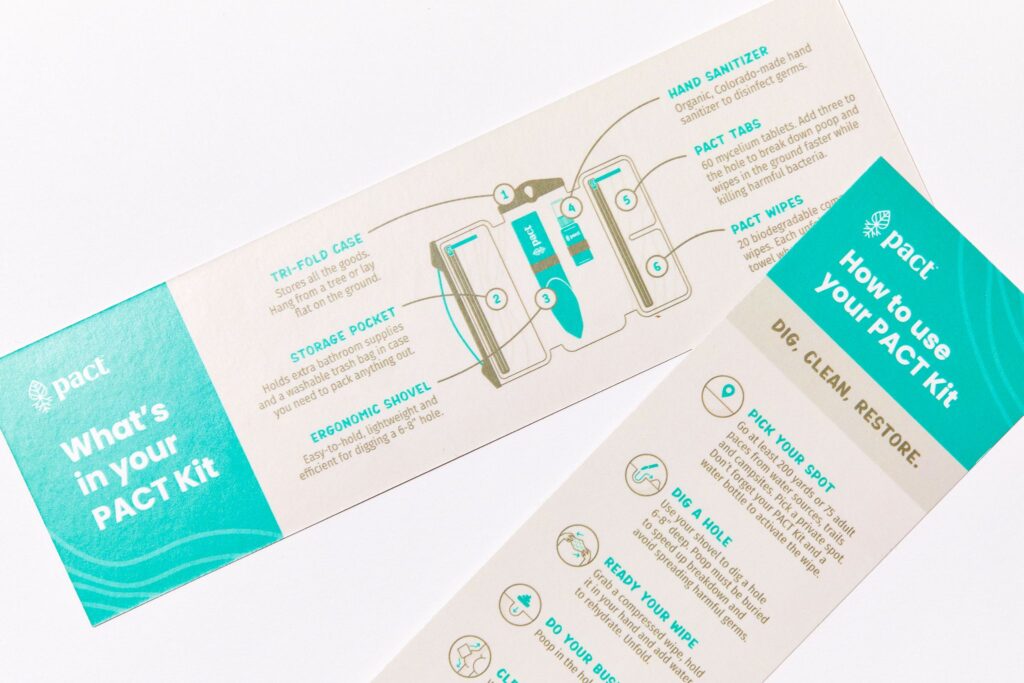
PACT Outdoors and their waste kits provide outdoor guides with a more professional, formalized option to relay to their clients who are paying top dollar for a premium experience. But Schum is quick to note that most guiding firms are not in the outdoor goods industry, and that the real value for PACT Outdoors is the vessel for positive word-of-mouth coming from respected professionals.
Currently, PACT Outdoors is not doing paid advertising, relying instead on positive word of mouth, consumer buzz, social media, and the sales boost accompanying two major awards.
“We want earned media, and we want to see what consumers are saying. Overall, we are right exactly where we thought we would be,” says Schum. The paid media, he notes, will start this spring across a variety of formats.
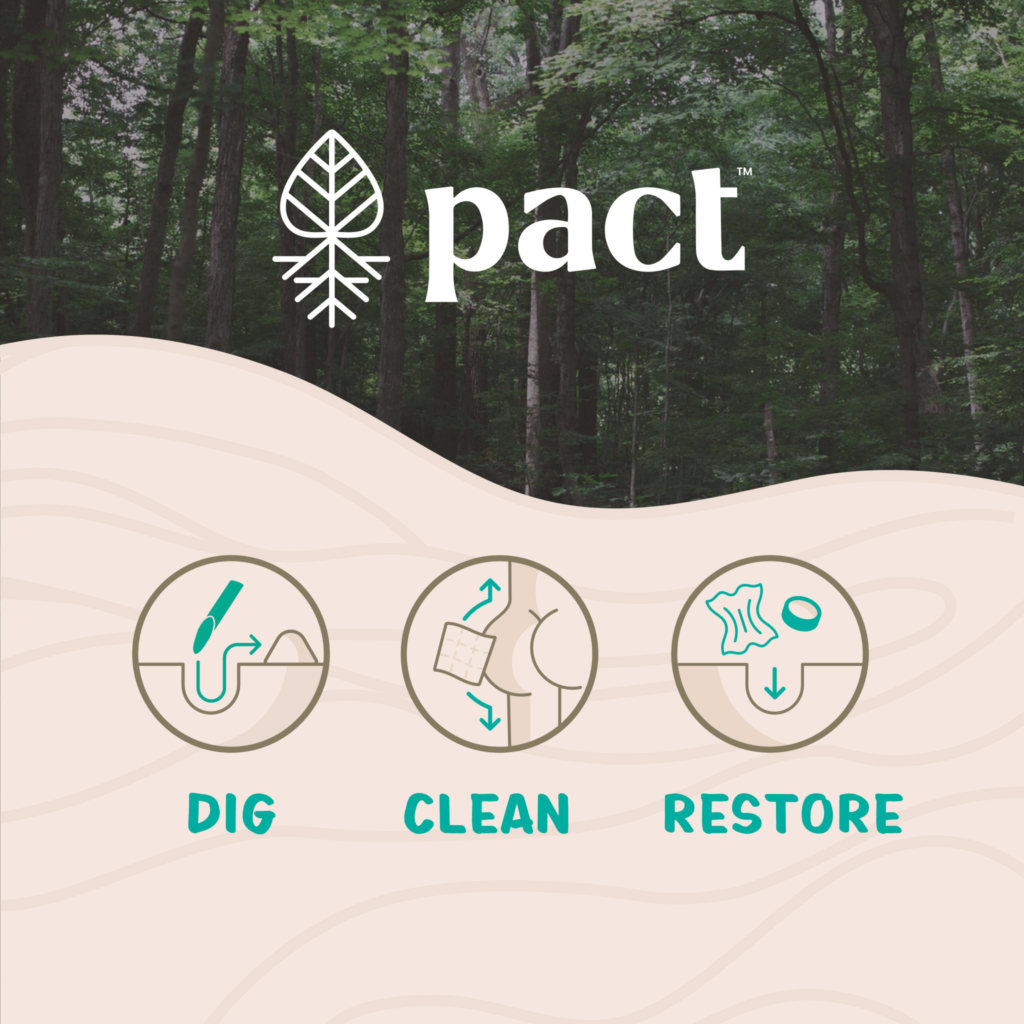
PACT Outdoors will also look to expand into more specialized corners of the outdoor recreation market with the release of more focused products. The company will soon start selling its all-in-one shovel kit, PACT Light, a lightweight take-down version where everything fits in the handle of the shovel. They will also produce kits designed for more stationary, campground usage, and even single-use products specifically designed for ultralight running and races.
Regarding the company’s competition, Schum says that while the company is forging its own path in the marketplace, they are always competing with the half-roll of toilet paper and the travel bottle of hand sanitizer.
“Everything is a competition. The home hack is still in the competition, because this is an expensive product versus [household items],” says Schum.

Financing the future
Up to this point, PACT Outdoors has been entirely self-funded by its co-founders. Moving ahead, the company will seek additional outside capital, primarily to fund advertising campaigns to blitz the market and bump their growth.
Schum says the company would prefer to find local investors but is open to options wherever they may be. Their key selling point? Impact. Not just of their product, but also of the company’s overall mission and ethos.
“This product, concept, [and] idea will take off as long as we can survive. That’s always the mission: survive long enough to where the adoption curve tilts,” says Schum of the company’s current strategy.
Long term, Schum and Thomas are thinking big.
“We’re trying to really own the outdoor bathroom market. Nobody has planted their flag there, and I feel like we have a great opportunity to,” adds Schum.
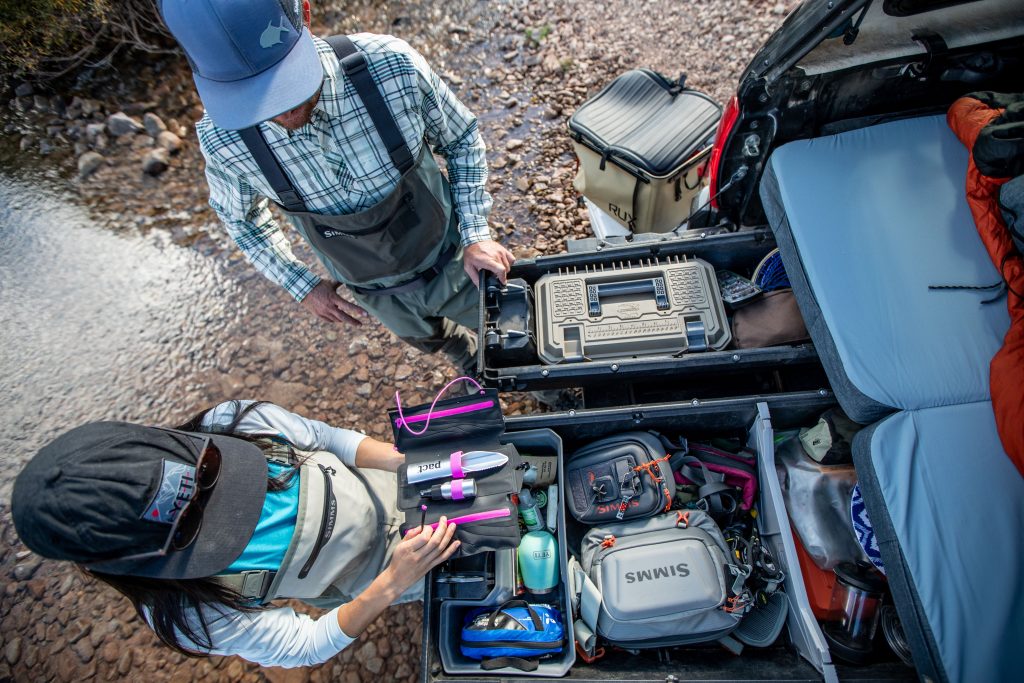
Later in the year, PACT Outdoors will become a regular on the outdoor trade show circuit, and seek out partnerships that could include product giveaways and donations with organizations like the National Forest Foundation and other outdoor advocacy and protection groups.
The biggest triumph for Schum and PACT Outdoors on their business journey is a close call. Schum, ever the product geek, cites getting a tangible physical product in his hands as a momentous moment.
Immediately after, he pivots and mentions hitting the mark with their customers, saying: “It’s the consumer that is going to be our lifeblood. Having their validation and enthusiasm and thanks…has been wind in our sails,” he says.
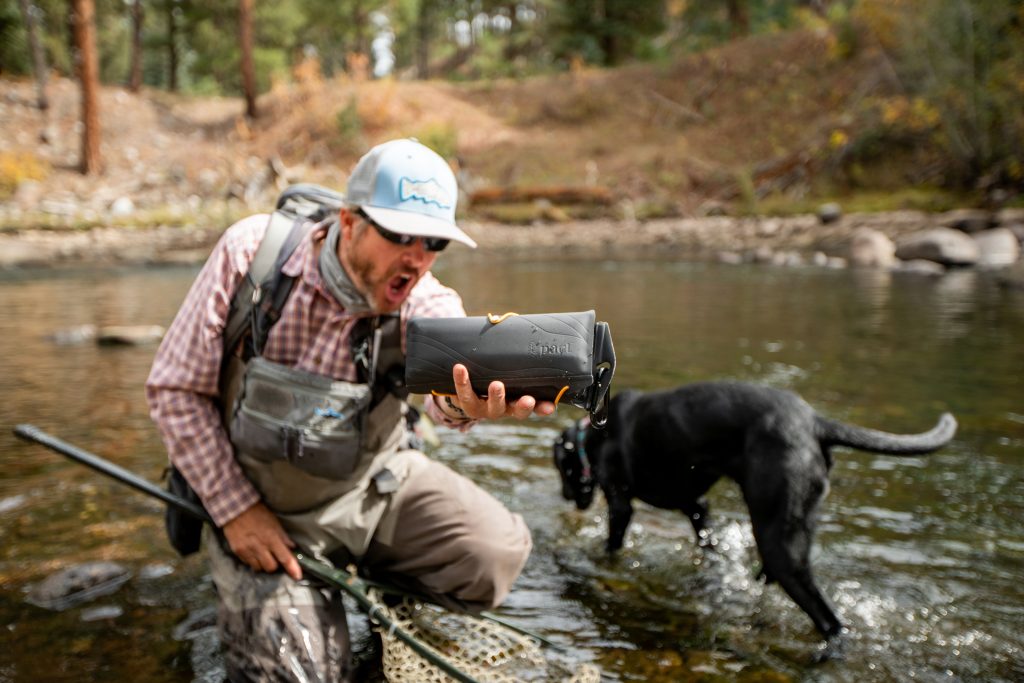
If you’re interested in learning more about PACT Outdoors and its products, you can visit their website because, after all, “nature is calling.”

